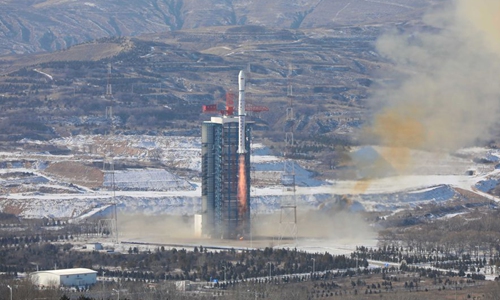HOME >> OPINION
China boosts Ethiopia’s space program
By Shen Shiwei Source:Global Times Published: 2019/12/22 17:58:39

Ethiopia's first-ever satellite, known as ETRSS-1, is launched on a Long March-4B carrier rocket at the Taiyuan Satellite Launch Center in North China's Shanxi Province on Dec 20, 2019. Photo: Xinhua
What does Ethiopia's first-ever satellite mean to this Horn of Africa country and the space program of the African continent at large?The dream came true on Friday. Ethiopia has become the 11th country in Africa to have its satellite launched after South Africa, Algeria, Morocco, Egypt, Kenya, Sudan, Angola, Nigeria, Ghana and Rwanda. At the Taiyuan Satellite Launch Center in North China's Shanxi Province, a Long March-4B carrier rocket brought a wide-range multispectral remote-sensing microsatellite donated to Ethiopia into space. The satellite program under the Belt and Road South-South Cooperation Initiative on Climate Change is the latest example of South-South Cooperation. It also points to space ambitions of several African countries.
Not surprisingly, China's assistance and cooperation with African countries has again come under scrutiny by some Western media outlets.
Many European space and defense companies have dominated Africa's satellite and telecommunications markets for decades.
For example, Egypt's first telecommunications satellite the Tiba 1 was launched from French Guiana in South America. The satellite was developed by Thales Alenia Space and Airbus Defence and Space as co-prime contractors, with the former acting as the consortium's lead partner.
But why is scrutiny of those Western companies over their intention of developing Africa's satellites rare?
For sure, the satellite will add a semblance of independence to Ethiopia's development.
Ethiopia is proud of its independence as it has never been colonized by a Western power. As a country of over 100 million people, Ethiopia had to spend precious foreign reserve to get information from foreign-owned satellites for many years. But now, everything will change with the ETRSS-1(Ethiopian Remote Sensing Satellite) launched with China's help. Ethiopia will observe its own satellite from the astronomical observatory at the Entoto Hills, Addis Ababa.
According to Ethiopian government, the satellite will be used for agriculture, mining, environmental protection and earth observatory purposes. It is also an important tool to issue alerts about the impact of climate change since extreme weather and drought caused food crisis in the country several years ago. What's more, the ETRSS-1 project will help Ethiopia develop space techniques of operating and managing the satellite since 21 Ethiopian scientists have participated in the program, five of whom are women.
The ETRSS-1 will not be Ethiopia's first "baby," and more is likely to come in the future.
Will China's help to Ethiopia to launch a satellite inject competition in Africa's satellite market?
Give back to business what is business' and to international development aid what is international development aid's. Africa's need for satellites is vast and countries providing competitive price and better technologies will win the bid.
Over the last 50 years, the number of countries that have launched satellites into the Earth's orbit has increased dramatically. But many African countries have to depend on renting costly foreign-owned satellites for economic and social development needs including telecommunication, weather forecast, agriculture monitoring and so on.
To reduce dependency on foreign satellites, several countries inked a cooperation program with companies from the US, Europe, Russia and Japan to launch their own satellites. Moreover, many satellite service companies from emerging markets like the Middle East and Asia-Pacific want to have their market share. But African countries still need to accumulate their own systemic capacity in satellite development, according to the space program initiated by the African Union. Hereby, China's space technology could provide a good option, both for international development and business programs.
Taking Ethiopia's first satellite as an example, the international development aid program will not only cover the launch, but also help Ethiopia build comprehensive capacity including talent training, experience sharing and the establishment of ground monitoring system. Similar programs have also been launched in Egypt. Early last September, the implementation phase of China-aided MisrSat II satellite project in Egypt kicked off. The program aims to improve Egypt's satellite development technology capacity. Meanwhile, Egypt is the first country to carry out satellite cooperation with China under the framework of the China-proposed Belt and Road Initiative.
Is China only providing grants for satellite? Of course not. Back in 2007, Chinese companies won the bid for Nigerian satellite projects via commercial competition. Countries adopt Chinese technology mainly because of all solutions could meet their standards. Since then, Chinese innovated and competitive technologies have gradually become known to African countries. Maybe in the future, there will be joint cooperation among companies from China, Africa and other countries. The space is vast enough for cooperation.
The writer is non-resident research fellow, Institute of African Studies, Zhejiang Normal University and research fellow of the Charhar Institute. opinion@globaltimes.com.cn
RELATED ARTICLES:
Posted in: VIEWPOINT